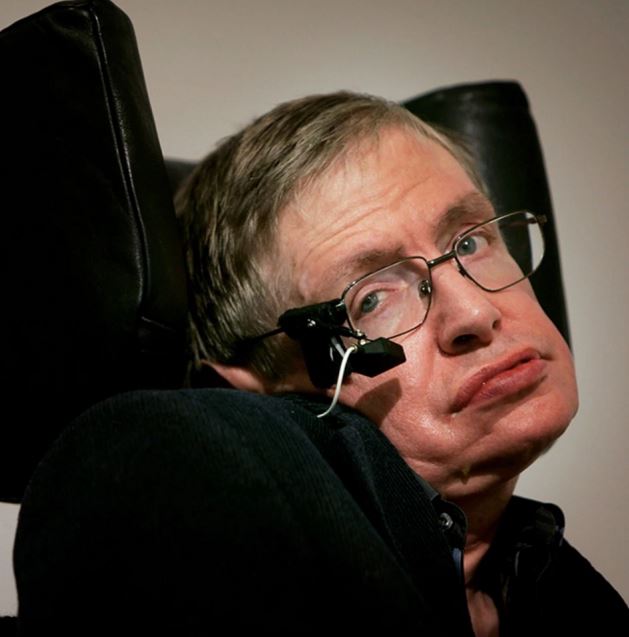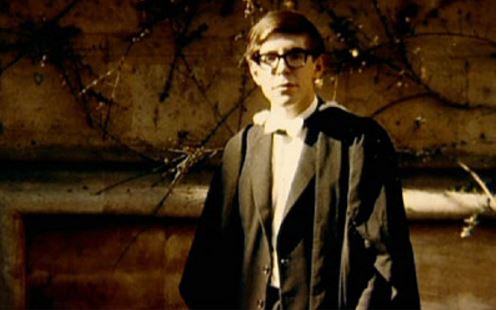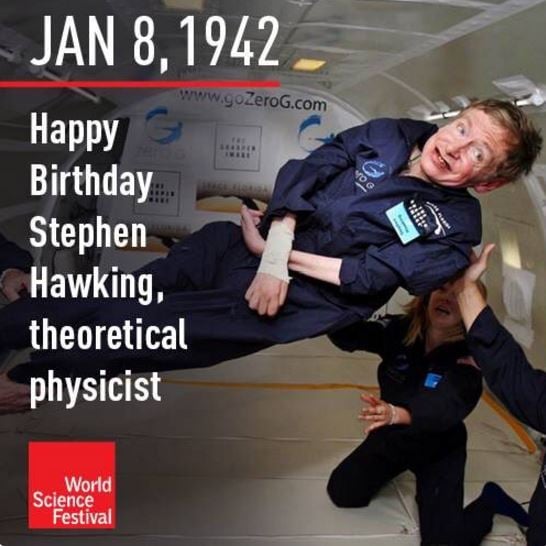Professor Stephen Hawking warns that there is a growing risk of self-destruction by the human race, caused by perhaps a genetically-engineered virus, climate change, nuclear war, or artificial intelligence that becomes too smart and turns against us. As we progress technologically and scientifically, this risk gets bigger, he adds. The danger, he emphasizes, will come from something of our own making.
The British theoretical physicist, cosmologist and author gave the talk at this year’s BBC Reith Lectures, which will be broadcast on BBC Radio 4 and BBC World Service on January 26th and February 2nd.
The BBC Reith Lectures are given once annually by leading figures of the day.
 During the lecture, Prof. Hawking said it may be possible to fall into a black hole and enter another universe. It would have to be a large, spinning black hole. However, a return trip would be impossible. (Image: hawking.org.uk)
During the lecture, Prof. Hawking said it may be possible to fall into a black hole and enter another universe. It would have to be a large, spinning black hole. However, a return trip would be impossible. (Image: hawking.org.uk)
Black holes may unlock mysteries of the Universe
During his speech, he also explores recent research into black holes. Places where matter collapses under the ultra-powerful pull of gravity to a point where the normal laws of physics no longer apply.
According to Prof. Hawking, black holes are ‘stranger than anything dreamed up by science fiction writers’.
He has developed a new theory about black holes that could provide a method to discovering the origins of the Universe. He theorises that black holes may have ‘hairs’ that contain information about their past, potentially solving the age-old ‘information problem’ of what happens to matter that falls into a black hole.
His gloom and doom warning came during a Question & Answer session when somebody in the audience asked: “Do you think the world will end naturally or will man destroy it first?”
New technologies increase risk to us
Prof. Hawking replied:
“We face a number of threats to our survival from nuclear war, catastrophic global warming, and genetically engineered viruses. The number is likely to increase in the future, with the development of new technologies, and new ways things can go wrong.”
“Although the chance of a disaster to planet Earth in a given year may be quite low, it adds up over time, and becomes a near certainty in the next thousand or 10,000 years. By that time, we should have spread out into space, and to other stars, so a disaster on Earth would not mean the end of the human race.
“However, we will not establish self-sustaining colonies in space for at least the next hundred years, so we have to be very careful in this period.”
 Stephen Hawking when he was 21 years old – the year he was diagnosed with motor neurone disease. (Image: philosophyofscienceportal)
Stephen Hawking when he was 21 years old – the year he was diagnosed with motor neurone disease. (Image: philosophyofscienceportal)
Some people find it ironic that one of the world’s most prominent scientists sees his own field – science – as a potential threat to our very existence.
Prof. Hawking’s fear of artificial intelligence threat
Prof. Hawking, along with other famous scientists and computer experts, has often expressed concern about the future risks we may face when artificial intelligence becomes super advanced.
In an interview with the BBC in 2014, he warned that artificial intelligence (AI) could spell the end of the human race.
He said basic forms of AI developed so far have already proved extremely useful, but he wonders what the consequences might be when we create something that can match or overtake our intelligence.
“It [AI] would take off on its own, and re-design itself at an ever increasing rate. Humans, who are limited by slow biological evolution, couldn’t compete, and would be superseded,” he added.
 Stephen Hawking was born in 1942 in Oxford, England. He is known for the Penrose–Hawking theorems, Hawking radiation and ‘A Brief History of Time’ (1988).
Stephen Hawking was born in 1942 in Oxford, England. He is known for the Penrose–Hawking theorems, Hawking radiation and ‘A Brief History of Time’ (1988).
We will find ways to cope
Prof. Hawking stressed that he believes humans will find ways to cope. “We are not going to stop making progress, or reverse it, so we have to recognise the dangers and control them. I’m an optimist, and I believe we can,” he said.
When a member of the audience asked him what advice he would give to the world’s young scientists, he replied that every researcher should retain a sense of wonder about our ‘vast and complex’ Universe.
Regarding his own experience, Prof. Hawking commented:
“From my own perspective, it has been a glorious time to be alive and doing research in theoretical physics. There is nothing like the Eureka moment of discovering something that no one knew before.”
Future generations of researchers, engineers and scientists need to become aware of how technological and scientific progress are changing the world so rapidly. It is important that this understanding is passed onto lay people.
Regarding scientific progress in democratic countries, Prof. Hawking said:
“It’s important to ensure that these changes are heading in the right directions. In a democratic society, this means that everyone needs to have a basic understanding of science to make informed decisions about the future.”
“So communicate plainly what you are trying to do in science, and who knows, you might even end up understanding it yourself.”
‘My work and sense of humour’
Prof. Hawking, who was diagnosed with motor neurone disease – a progressive disease that attacks the motor neurones, or nerves, in the brain and spinal cord – when he was 21 years old, was asked what motivates him to keep going.
He replied as follows:
“My work and a sense of humour. When I turned 21, my expectations were reduced to zero. You probably know this already because there’s been a movie about it. It was important that I came to appreciate what I did have.”
“Although I was unfortunate to get motor neurone disease, I’ve been very fortunate in almost everything else. I’ve been lucky to work in theoretical physics at a fascinating time, and it is one of the few areas in which my disability is not a serious handicap.”
“It’s also important not to become angry, no matter how difficult life is, because you can lose all hope if you can’t laugh at yourself and life in general.”
Hawking feels close to Galileo
Prof. Hawking was Lucasian professor of Mathematics for thirty years, a position once held by Isaac Newton (1642 – 1726/27). It is one of the most prestigious academic positions in the United Kingdom.
However, he said he felt closer to Galileo Galilei (1564-1642), an Italian astronomer, physicist, mathematician, engineer, and philosopher who played a major role in the scientific revolution during the Renaissance.
If he had access to a time machine, Prof. Hawking said he would pick Galileo as his number one choice of somebody to visit.
Poor health in November forced Prof. Hawking to postpone the recording of the Reith Lecture. On 7th January, one day before his 74th birthday, he delivered the talk to a 400-strong audience at the Royal Institution in London.
Video – Stephen Hawking’s Doomsday Predictions
CBSN’s Contessa Brewer reports on what Prof. Stephen Hawkins said about the fate of humankind. He also said, on the bright side, that we’ll probably already be in space when a catastrophy happens on Earth.
